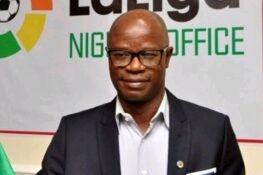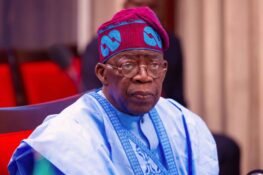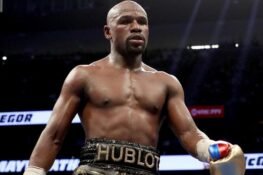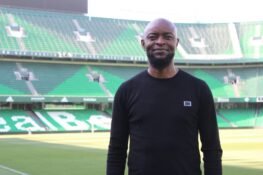Nigerian athlete, Tobi Amusan, in an exclusive interview said athletes based in the country should be encouraged and allowed to participate in more competitions to be in better shape. Excerpts…
How would you describe your 2018 from the start of the season till this moment?
I want to say thank you to Jesus my Saviour, because it’s been an injury-free season. Even though I didn’t get the time I wanted to run this year, I am grateful that everything worked out for me. It was a pretty good season.
It’s over already and I am going to focus on the new year, especially towards the All Africa Games and the World Championships. I am going to take it one step at a time.
2019 is going to be a busy year for you and other athletes. You are the defending champion of the All Africa Games in 100mh; are you under any pressure to retain the title and also do better than you did in 2018?
I don’t work with pressure. I just want to go into every competition with the mind-set of executing my race, focusing on nobody but myself and just to do my thing. It’s going to be one meet at a time for me; I am not going to put myself under any pressure.
We have everything we need to be better as athletes and students; it’s more like focusing on yourself all the time. You don’t have many people putting pressure on you; it’s always you and your coach doing your thing, compared to Nigeria where everyone is trying to tell you what to do and how to do it, telling you where you have to go and vice versa.
How have you been managing your career as an athlete and a student in the US despite all the competitions you participated in last year?
The truth is they call us student athletes, so they (athletics and academics) work hand in hand, but with the mind-set I have, I try my best to balance both. After track, I will have to fall back on my degree, so it’s pretty much important that I balance both and don’t allow one to outweigh the other. I balance both with the same energy both on the track and in the class.
You have been in the US for a while now; how has it been compared to when you were in Nigeria?
We have everything we need to be better as athletes and students; it’s more like focusing on yourself all the time. You don’t have many people putting pressure on you; it’s always you and your coach doing your thing, compared to Nigeria where everyone is trying to tell you what to do and how to do it, telling you where you have to go and vice versa.
The truth is, a lot of negative things go on when you train in Nigeria. In Nigeria, we don’t have good facilities to train, athletes go home not sure of what to eat, they don’t rest. Sometimes they have to trek home after training and so on.
In the US, everything has been programmed. Before you go for practice, you have to go to your trainer and be sure everything is right with you before you step on the track. After the training you go in to get everything fixed, you don’t have an excuse to stop you from training the following day.
You go home to rest and the following day you are ready for the school work and the other things. If you compare this to Nigeria where after training, you get home and your family start sending you here and there, you have to prepare food, wash the plates, clean the house etc.
That’s a lot for an athlete who will have to combine all that with education. That has been the problem with athletes based at home; that’s the same thing I had to endure while still in the country before I travelled to the US.
I don’t work with pressure. I just want to go into every competition with the mind-set of executing my race, focusing on nobody but myself and just to do my thing. It’s going to be one meet at a time for me; I am not going to put myself under any pressure.
What do you want to say about the lack of competitions for athletes in Nigeria?
I must say that competing actively has a lot to do with an athlete’s performance especially when it has to do with hurdling, because before you get into that tour rhythm you have to compete a lot.
I remember when I was at home during the whole of June due to my inability to get a Schengen Visa. It affected me for the second phase of my European tour going into the Diamond League. For the whole week, I was just training, didn’t know where I stood, just kept training by myself compared to other times when I had to race against other girls where I could ascertain my level and look forward to what I need to correct or work on.
When you just have to participate in one, two or three meets in a year, it doesn’t work at all. You have to keep it going as an athlete. It just has to be competition after competition. In the US, you don’t just train, but after training the next thing is the competition as long as you are in the season.
The competitions keep you in shape as an athlete. Once you go for a track meet and you come back, you have to rest because in the next two days you are on your way for another meet. You get better competing every week compared to when you have to stay for weeks and sometimes months before the next competition.
The athletes at home need to compete more. But, it’s not just that, they need to be encouraged more, because without money, they cannot achieve much.
The athletes at home need to compete more. But, it’s not just that, they need to be encouraged more, because without money, they cannot achieve much.
It has been an eventful career for you since 2013 when you came into the limelight at the maiden African Youth Athletic Championships in Warri, Delta State. Can you say you are where you want to be?
Definitely not. God has been awesome and looking back at when I started hurdling and people were trying to discourage me that hurdling doesn’t take athlete anywhere. They kept asking me to go for full sprint.
Even my uncle at the time kept telling me that I stood a better chance to be selected in the sprints than hurdle. I actually wondered why people kept looking down at hurdles, so I tried my best to rule the event in the country and in the world.
I am really thankful to God that I am able to achieve such height at this moment because it’s not just by my power and hard work alone. Hurdle is not what you just learn in a day; you continue to learn everyday even up till 10 years. I am still learning and will continue to do so till I end my career. I am yet to get to the peak but with hard work and God on my side, I will get there.
After Gloria Alozie, people are looking up to you ahead of the next Olympic Games to put the name of the country on the medals table; do you think you have what it takes to get to the podium after finishing fifth at the last Games in Brazil?
Like I always say, I don’t put myself under any pressure ahead of any championships, I just take every competition one after the other, execute my race and see what happens at the end of the day. The truth is before 2020, I still have a lot to achieve in 2019 and that’s what I am focusing on at the moment and waiting on God to direct me and also help me to have an injury-free season.








